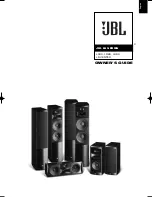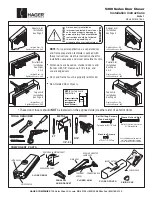
MAINTENANCE
COOLING SYSTEM
HOT COOLANT
can burn skin.
• Do not remove cap if radiator is hot.
--------------------------------------------------------------------
Check the coolant level by observing the level in the radiator and
recovery bottle. Add 50/50 antifreeze / water solution if the level is
close to or below the "LOW" mark. do not fill above the "FULL" mark.
Remove radiator cap and add coolant to radiator. Fill up to the top of
the tube in the radiator filler neck which includes a connecting hose
coming from the thermostat housing.
To drain the coolant, open the valve at the bottom of the radiator.
Open the radiator cap to allow complete drainage. (Tighten the valve
and refill with a 50/50 antifreeze/water solution.) Use an
automotive grade (low silicate) ethylene glycol antifreeze. The cooling
system capacity is 4.8 qts. (4.5L.). Squeeze upper and lower radiator
hoses while filling to bleed air from system coolant. Replace and
tighten the radiator cap.
Always premix the antifreeze and clean tap water before
adding to the radiator. It is very important that a precise
50/50 solution be used with this engine year round. This
gives proper cooling during hot weather and freezing
protection to -34° F (-37° C).
Cooling solution exceeding 50% ethylene glycol can result
in engine overheating and damage to the engine. Coolant
solution must be premixed before adding to radiator.
Periodically remove the dirt from the radiator fins.
Periodically check the fan belt and radiator hoses. Replace if signs of
deterioration are found.
TIGHTENING THE FAN BELT
If the fan belt is loose, the engine can overheat and the battery lose
its charge. Check tightness by pressing on the belt midway between
the pulleys. It should deflect about .25 in.(6.4 mm) under a load of 20
lbs.(9 Kg).
FUEL
DIESEL FUEL ONLY-Low sulphur fuel or ultra low sulphur fuel in U.S.A.
and Canada.
At the end of each day’s use, refill the fuel tank to minimize moisture
condensation and dirt contamination in the fuel line. Do not overfill;
leave room for the fuel to expand.
Use only fresh No. 2D diesel fuel, the use of No. 1D diesel fuel is
recommended in place of No. 2D at temperatures below
23°F (-5°C). Do not use kerosene.
See the Engine Operator's Manual for instructions on replacing the
fuel filter.
BLEEDING THE FUEL SYSTEM
You may need to bleed air from the fuel system if the fuel filter or fuel
lines have been detached, the fuel tank has been ran empty or after
periods of long storage. It is recommended that the fuel shutoff valve
be closed during periods of non-use.
To avoid personal injury, do not bleed a hot engine. This
could cause fuel to spill onto a hot exhaust manifold,
creating a danger of fire.
Bleed the fuel system as follows:
1. Fill the fuel tank with fuel.
2. Open the fuel shut off valve.
3. Open bleed fitting on fuel sedimenter, the sedimenter should
gravity fill itself with fuel.
4. Tighten the bleed fitting on fuel sedimenter after sedimenter fills
with fuel.
5. Loosen bleed fitting on the fuel injector manifold.
6. Operate hand priming lever until fuel comes out the bleed screw
on the injector manifold. This could take 20-30 seconds of rapid
operation of the priming lever. Tighten bleed fitting on injector
manifold.
7. Follow normal STARTING procedures until engine starts.
FUEL FILTER
1. Check the fuel filter and fuel pre-filter for water accumulation or
sediment.
2. Replace the fuel filter if it is found with excessive water
accumulation or sediment. Empty fuel pre-filter.
WARNING
CAUTION
WARNING
CROSS COUNTRY 300
D-4













































